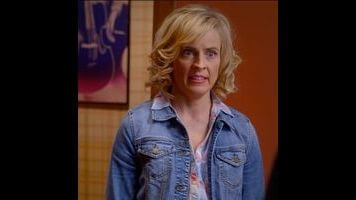Lady Dynamite’s sitcom simulacrum tries on a pleasing new voice

What happens when you set aside your own desires, your personality, even your voice, to make other people happy? Nothing good, except an excellent episode of Lady Dynamite. At a stressful dinner party—Bruce’s ex-wife and her young lover spend the evening canoodling, oblivious to their guests—Maria laments her discomfort with strangers. “I just wish I could be one of those people who could talk about wine and and tennis and Mercedes Benzeses.” So she becomes one of those people.
As Diane Winterbottom Monte, natural extrovert, Harvard Lady Bobcat, and small-talker extraordinaire, Maria changes more than her voice. Everything about Diane is different: her car, her house, her phone greeting. (“Go for Diane!”) She’s outgoing, holding people spellbound with accounts of black-diamond skiing, playing tennis with Bono and “the Kennedy girl,” or days spent carbonating her pool in her solid-gold tankini and belly chain. Her body language is upright but relaxed, full of “an unearned sense of confidence.”
Later in the episode, Maria hosts a brunch at her house for her friends, and her body language and voice are pure Maria: bubbly, wholeheartedly goofy, and—most of all—happy. At Barbara’s, she didn’t counterfeit Diane’s expansive confidence just for her own comfort, but to put her fellow guests at ease. She did it to please strangers, not to please herself.
The thing about people-pleasing is… well, sometimes it works. Diane opens doors for herself without even trying. After one dinner masquerading as Diane, Maria’s booked as the pilot of Locked Up A Broad (no, not that one) and she thoroughly charms Jack Tripper (no, not that one). And it only cost her a lot of energy, her voice (“I need a Sucrets”), and every aspect of her personality.
“Jack and Diane,” written by Matt Ross and Max Searle, is as close to a traditional sitcom plot as Lady Dynamite has veered so far, packed with wacky misunderstandings. Jack Tripper’s (Brandon Routh) name is a nod to the episode’s classic sitcom conventions, as is his position at Wilkins and Marshall, “a division of the Three Company.” But “Jack and Diane” is also a tightly constructed script tying together the common experience of sidelining your own needs to please a new flame with the larger problem of forfeiting your own happiness trying to make others happy. That’s a losing proposition even when it’s successful.
When it works, Maria submerges her personality and desires to connect with other people. Jack likes a popular coffee chain and a popular sitcom. So, she says, does Diane. What are the odds?! Even if she weren’t a phony amalgamation of popular tastes, the odds would be great; that’s what “popular” means. Meanwhile, trying to connect with Maria and her comedian friends—“and Kindler,” Jack, who hates laughter and finds nothing funny, pretends to have a sense of humor. Everyone loses.
When it doesn’t work, it’s even worse. Trying to curry favor leads Maria to unfortunate impulses, large and small. She lets a co-worker pressure her into delivering her absurdist stand-up to colleagues warmed up by warmed-over Borat lines. Grasping for common ground, she tries physical comedy: “Is that something people can relate to? Goddamn it, goddamn it.” The “Eye Of The Beholder” rictus she creates with a roll of tape emphasizes both her isolation and her attempt to reshape herself, at least externally, in the name of conformity. Only when she stops seeking their approval and immerses herself in her work does she find something like peace.
In another timeline, Maria succumbs to teasing from her pushy best friend and her pushy best friend’s pushy realtor. She buys a house just to make Susan happy—and instead makes Susan miserable,. When Maria abdicates her own persona, her own voice, and her own needs trying to please other people, no one’s real needs get met. As the episode-ending song says, “before you pleasure someone else, you got to pleasure yourself.
I often find Mo Collins’ schtick so broad that it can break the reality of a show’s universe, from Orange County to Pawnee. But as Maria’s lifelong frenemy Susan—and especially as Maria’s exaggerated vision of Susan—her bluntness feels paradoxically pointed, and she uses it to needle Maria as only an intimate acquaintance can. Pairing her up with June Diane Raphael as Karen Grisham (no, not that one) is inspired, turning the two into an unstoppable brace of mean-girl types with great hair and bad boundaries.
The dynamic between Susan and Karen is another note of exaggerated sitcom convention in “Jack And Diane,” but Lady Dynamite isn’t pulling a Diane Winterbottom Monte. This is no episode of Three’s Company, or even Seinfeld. Whether it’s Fred Melamed looking somberly into the distance while Maria looks around for the source of the haunting saxophone solo or Brandon Routh intently sipping wine during a 30-second fart, the show’s characteristic absurdity—even surrealism—rings out loud and clear. Even when it plunges into sitcom conventions, Lady Dynamite speaks in its own distinctively giddy, enormously pleasing voice.
Stray observations
- “Cosby, SeaWorld? How could it miss?”
- Brandon Routh plays Jack Tripper’s deadpan lack of humor with serene calm that almost camouflages his comic timing.
- “I can’t stop thinking about Patton.” “You are, like, the fifth guy to say that while I’m enjoying intimacy with them.”
- Patton Oswalt shares his ADR notes.
- “I thought this was a comics’ brunch?” “Nobody’s Periscoping.” The Lucas Bros. and Maria clinkety-clinking a dozen times made me want to invite them all to brunch.
- Here’s hoping Barbara returns, giving Joanna Cassidy a chance to develop this broad character into another cuttingly precise performance, as she did on Married.
- “You know what they say: You don’t want to be the least murdery house in the most murdery street.”